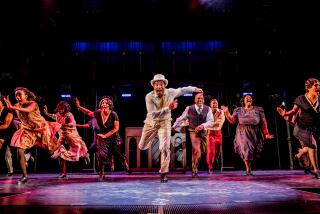‘Jersey Boys’ is old-school entertainment with surprising edge

Kenneth Turan reviews ‘Jersey Boys’. Video by Jason H. Neubert.
- Share via
Because his movies often dance to a violent tune, it’s easy to forget Clint Eastwood’s passion for music. He directed “Bird” as well as “Honkytonk Man,” and for the past decade he’s also composed many of the scores for his films. But if you think music was the only reason he directed “Jersey Boys,” you would be missing the point.
That’s not to say that the 100-million-record-selling rock anthems by the Four Seasons, classics such as “Sherry,” “Big Girls Don’t Cry,” “Walk Like a Man, “Dawn (Go Away)” and “Rag Doll,” that are the emotional center of Eastwood’s latest film were not a draw for the man who is old enough to remember these tunes when they first came out.
An allied musical lure is the crowd-pleasing success of the Broadway musical the film is based on, the Tony-winning story of how “little Frankie Castelluccio” (a.k.a. Frankie Valli) and his New Jersey comrades created these songs, a show still playing around the world and the 13th-longest-running in Broadway history.
But to see “Jersey Boys” is to feel something else is going on as well. As much as showcasing the music, Eastwood has been interested in the parts of the play that recount the entire span of these intertwined lives and show as much concern for the group’s turbulent relationships away from the studio as for the music that flowed out of it.
If this involvement with what it took for four guys from the mean streets of New Jersey to become international celebrities gives “Jersey Boys” a bit of a darker cast than its Broadway predecessor, that doesn’t stop it from being pleasantly enjoyable. Eastwood, as always, has simply done things his own way, and the result is a leisurely old-school entertainment with a bit more edge than you may be expecting.
To do all this most effectively, the director went back to the original show in more ways than one. He first returned to the first screenplay ever written for the film by Marshall Brickman and Rick Elice, who wrote the original show.
When it came to casting, the only movie star to be found is supporting player Christopher Walken in the role of Jersey mobster Angelo “Gyp” DeCarlo, a major Frankie Valli fan.
Instead, three of the quartet of singers in the Four Seasons are played by actors who have been in the play either on Broadway or in the national touring company, starting with John Lloyd Young, who took home a Tony for actor in a musical for originating the Frankie Valli role.
“Jersey Boys” opens with the one newcomer among the actors playing the Seasons, Vincent Piazza as live wire Tommy DeVito, talking to the camera and letting us know that if “you want to hear the real story” about the band, you’ve come to the right place. Namely him.
This notion of giving each band member the space to “remember it how they need to” is the conceit the film is structured around. And brash, expansive, high-energy Tommy, who explains that of the three ways to get out of their Jersey neighborhood (“you join the Army, you get mobbed up or you get famous”) the Seasons hit two out of three, is an ideal way to get us into the story.
Aspiring musician Tommy works in the barbershop of “little Frankie’s” father, where Gyp DeCarlo (Walken looking like death warmed over) is a favored customer. The mobster is an unwavering devotee of the teenage Frankie and his distinctive falsetto sound, which he characterizes as “a voice that is a gift from God.”
With the addition of bass guitarist Nick Massi (Michael Lomenda), the trio plays small Jersey clubs under an assortment of names before they run into the missing ingredient: songwriter and future band member Bob Gaudio (Erich Bergen), who hears Valli sing and says without hesitation, “I wanted to write for this voice.”
Gaudio takes over the narrating chores at this point, to be succeeded first by Valli himself and finally by bass guitar Massi, the band’s quiet man no more.
Though it is great to hear the songs, this “Jersey Boys” doesn’t shy away from the story of how unexpected fame unhinged these guys, wreaked havoc with their personal lives, preyed on their weaknesses and allowed them the opportunity to both succeed and fail on a grander scale than they ever imagined.
This sense of a life and its consequences is one of the things that attracted Eastwood. He also connected to the sense that through it all, the Four Seasons remained Jersey boys, true to the code of the neighborhood, no matter what.
Twitter: @KennethTuran
------------------------------
‘Jersey Boys’
MPAA rating: R for language throughout
Running time: 2 hours, 12 minutes
Playing: In general release
More to Read
Only good movies
Get the Indie Focus newsletter, Mark Olsen's weekly guide to the world of cinema.
You may occasionally receive promotional content from the Los Angeles Times.











